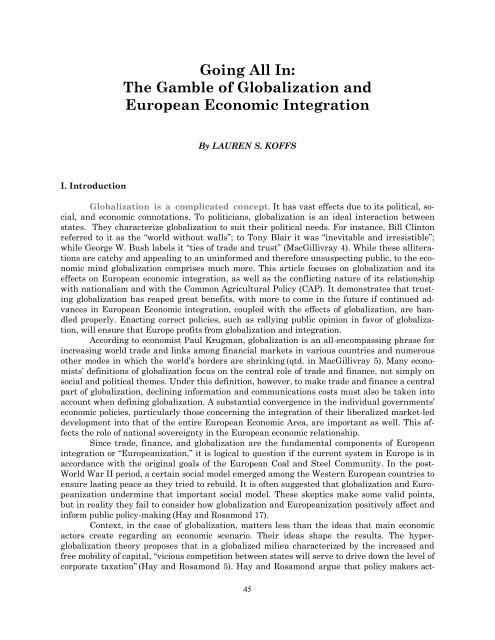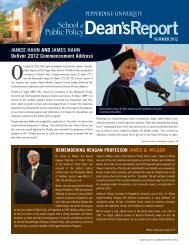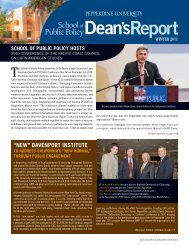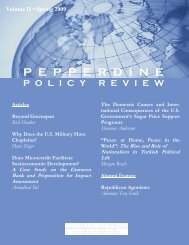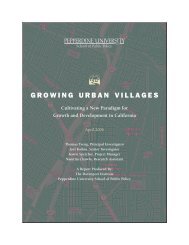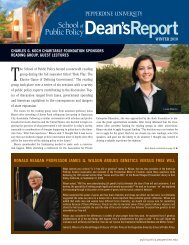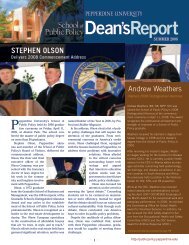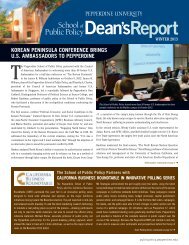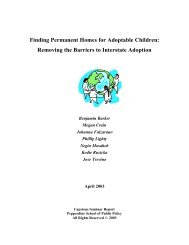Pepperdine University School of Public Policy
Pepperdine University School of Public Policy
Pepperdine University School of Public Policy
You also want an ePaper? Increase the reach of your titles
YUMPU automatically turns print PDFs into web optimized ePapers that Google loves.
Going All In:<br />
The Gamble <strong>of</strong> Globalization and<br />
European Economic Integration<br />
By LAUREN S. KOFFS<br />
I. Introduction<br />
Globalization is a complicated concept. It has vast effects due to its political, social,<br />
and economic connotations. To politicians, globalization is an ideal interaction between<br />
states. They characterize globalization to suit their political needs. For instance, Bill Clinton<br />
referred to it as the “world without walls”; to Tony Blair it was “inevitable and irresistible”;<br />
while George W. Bush labels it “ties <strong>of</strong> trade and trust” (MacGillivray 4). While these alliterations<br />
are catchy and appealing to an uninformed and therefore unsuspecting public, to the economic<br />
mind globalization comprises much more. This article focuses on globalization and its<br />
effects on European economic integration, as well as the conflicting nature <strong>of</strong> its relationship<br />
with nationalism and with the Common Agricultural <strong>Policy</strong> (CAP). It demonstrates that trusting<br />
globalization has reaped great benefits, with more to come in the future if continued advances<br />
in European Economic integration, coupled with the effects <strong>of</strong> globalization, are handled<br />
properly. Enacting correct policies, such as rallying public opinion in favor <strong>of</strong> globalization,<br />
will ensure that Europe pr<strong>of</strong>its from globalization and integration.<br />
According to economist Paul Krugman, globalization is an all-encompassing phrase for<br />
increasing world trade and links among financial markets in various countries and numerous<br />
other modes in which the world’s borders are shrinking (qtd. in MacGillivray 5). Many economists’<br />
definitions <strong>of</strong> globalization focus on the central role <strong>of</strong> trade and finance, not simply on<br />
social and political themes. Under this definition, however, to make trade and finance a central<br />
part <strong>of</strong> globalization, declining information and communications costs must also be taken into<br />
account when defining globalization. A substantial convergence in the individual governments’<br />
economic policies, particularly those concerning the integration <strong>of</strong> their liberalized market-led<br />
development into that <strong>of</strong> the entire European Economic Area, are important as well. This affects<br />
the role <strong>of</strong> national sovereignty in the European economic relationship.<br />
Since trade, finance, and globalization are the fundamental components <strong>of</strong> European<br />
integration or “Europeanization,” it is logical to question if the current system in Europe is in<br />
accordance with the original goals <strong>of</strong> the European Coal and Steel Community. In the post-<br />
World War II period, a certain social model emerged among the Western European countries to<br />
ensure lasting peace as they tried to rebuild. It is <strong>of</strong>ten suggested that globalization and Europeanization<br />
undermine that important social model. These skeptics make some valid points,<br />
but in reality they fail to consider how globalization and Europeanization positively affect and<br />
inform public policy-making (Hay and Rosamond 17).<br />
Context, in the case <strong>of</strong> globalization, matters less than the ideas that main economic<br />
actors create regarding an economic scenario. Their ideas shape the results. The hyperglobalization<br />
theory proposes that in a globalized milieu characterized by the increased and<br />
free mobility <strong>of</strong> capital, “vicious competition between states will serve to drive down the level <strong>of</strong><br />
corporate taxation” (Hay and Rosamond 5). Hay and Rosamond argue that policy makers act-<br />
45


